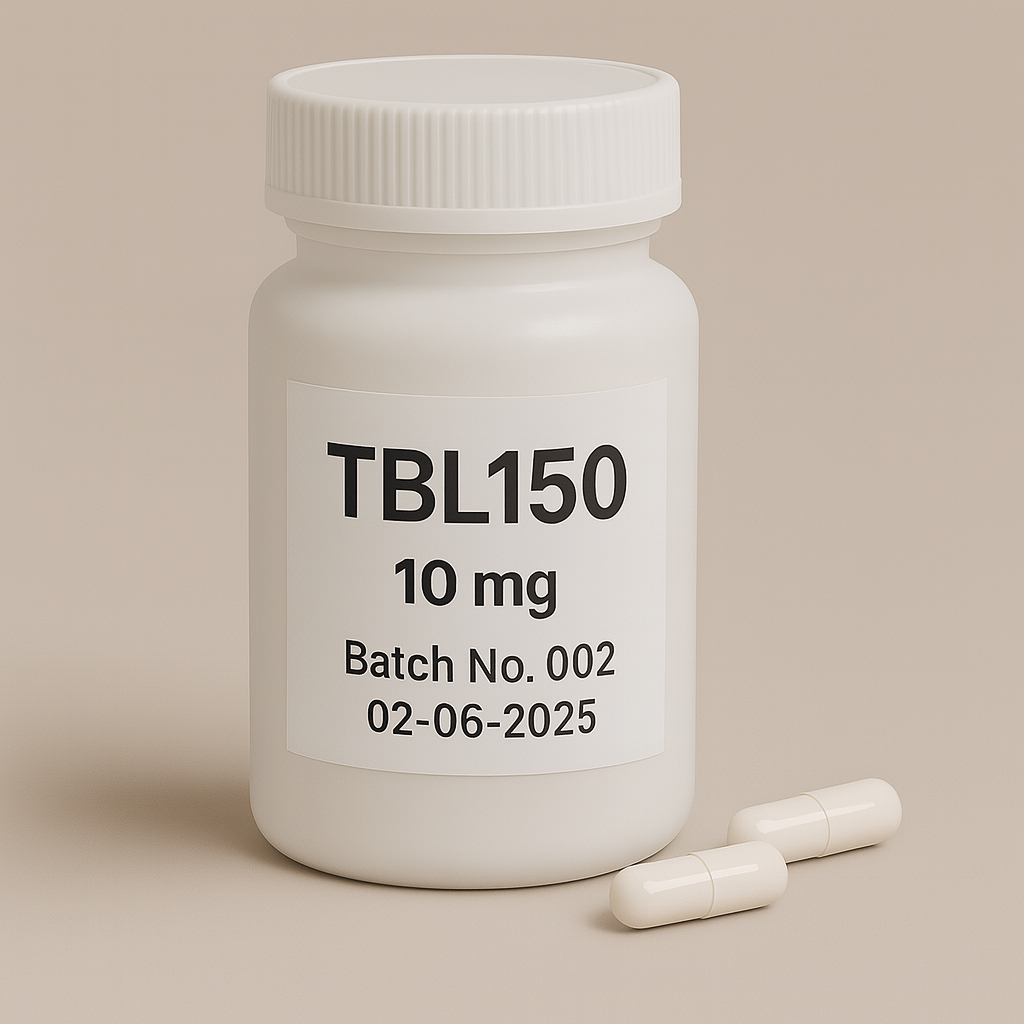
TBL150(rad150) 100x10mg
Pickup currently not available
NOT FOR HUMAN CONSUMPTION
TLB-150 (RAD-150 benzoate) is an investigational, non-steroidal selective androgen receptor modulator (SARM). It is widely described as the benzoate ester analogue of RAD-140 (testolone), engineered to maintain AR selectivity while potentially extending exposure versus the parent scaffold. In vitro vendor data list potent AR modulation in the sub-micromolar range; no approved medical indication or registrational trials exist. medchemexpress.comSports Technology Labs
Additional Benefits of TLB-150 Now Under Investigation
| Benefit | Key take-aways |
|---|---|
| 1 Duration/steadiness vs RAD-140 | The benzoate ester is promoted to prolong active lifespan and smooth concentration–time curves compared with RAD-140; this remains unverified in humans. Sports Technology Labs |
| 2 Muscle anabolism (class effect) | As an AR agonist, TLB-150 is positioned to increase fat-free mass and strength similarly to first-gen SARMs—direct human efficacy data for TLB-150 are absent. |
| 3 Bone support (class effect) | SARMs up-regulate osteoblast pathways and improve BMD in animals; TLB-150 is presumed comparable pending direct studies. |
| 4 Oral convenience | Once-daily oral SARM paradigms favor adherence vs injectables; specific TLB-150 PK in humans is unknown. |
| 5 Potentially lower androgenic “baggage” | Like other non-steroidal SARMs, design intent is muscle/bone selectivity with less prostate/skin stimulation than testosterone—needs confirmation. |
| 6 Research-use positioning | Commercial listings emphasize research-use only and lack of regulatory approval. medchemexpress.com |
| 7 SARM-class synergy with resistance training | Expect additivity with structured training/protein adequacy (extrapolated from SARM literature). |
| 8 Dosing flexibility | If ester prolongation holds, lower/fewer doses could yield similar exposure (hypothesis). Sports Technology Labs |
| 9 Doping relevance | As a SARM, TLB-150 would be prohibited at all times under WADA S1 (Anabolic Agents). U.S. Anti-Doping Agency (USADA)wada-ama.org |
2. Molecular Mechanism of Action
2.1 Receptor Pharmacodynamics
TLB-150 binds the androgen receptor (AR), promoting nuclear translocation and ARE-driven transcription. In muscle, AR activation up-regulates mTOR/S6K and suppresses atrogenes (MAFbx/MuRF1); in bone, AR signaling supports osteoblastogenesis and trabecular integrity (inferred from SARM class biology).
2.2 Down-stream Biology
| Pathway | Functional outcome | Context |
|---|---|---|
| AR → mTOR/S6K/4E-BP1 | ↑ Protein synthesis, myofiber hypertrophy | Skeletal muscle |
| AR ↔ Wnt/β-catenin/Osterix | ↑ Osteoblast activity, ↑ BMD | Bone |
| ↓ FoxO/ubiquitin ligases | ↓ Proteolysis (anti-catabolic) | Catabolic stress |
| HPG-axis feedback | ↓ LH/FSH/testosterone (suppression) | Pituitary–gonadal |
3. Pharmacokinetics
-
Route: Oral (research use).
-
Design rationale: Benzoate esterification of RAD-140 intended to enhance stability and effective half-life; quantitative human PK is undetermined. Sports Technology Labs
-
Metabolism/clearance: Expected ester hydrolysis → RAD-140-like core + oxidative/conjugative metabolism; formal human data unavailable.
-
Detection: As a SARM, long-term metabolites may extend detection windows in doping control (extrapolated from class).
4. Pre-clinical and Translational Evidence
4.1 Identity & in-vitro profiling
Commercial technical sheets list AR modulation with sub-µM potency and CAS 1208070-53-4; peer-reviewed in-vivoefficacy for TLB-150 specifically is limited/publicly sparse. medchemexpress.com
4.2 Extrapolation from RAD-140/SARM literature
Anabolic FFM gains, strength improvements, and bone protection are well described for earlier SARMs in animals and small human studies; whether TLB-150 surpasses RAD-140 clinically is unknown.
Evidence quality note: TLB-150 data are largely vendor-level and pre-clinical; there are no authoritative human RCTs or approvals.
5. Emerging Clinical Interests
| Field | Rationale | Current status |
|---|---|---|
| Sarcopenia/rehab | Oral anabolic with putative longer exposure | Concept/extrapolation |
| Osteopenia | Bone-anabolic SARM class biology | Pre-clinical rationale |
| Male contraception research | Strong HPG suppression is a SARM class effect—unproven for TLB-150 | Hypothesis only |
| Athletics (illicit use) | Oral potency + duration = high misuse potential | WADA-prohibited U.S. Anti-Doping Agency (USADA) |
6. Safety and Tolerability
-
Known/expected class effects:
HPG-axis suppression (↓ LH/FSH/testosterone), HDL-C reduction (± ↑ LDL/TG), possible ALT/AST elevations, acne/oily skin, mood/insomnia, mild ↑ hematocrit. -
Unknowns for TLB-150: Human PK, dose–response, long-term hepatic/CV outcomes, neuropsychiatricsignals.
-
Quality risks: Grey-market products show adulteration/mislabeling; use outside trials is unsafe.
-
Drug interactions: Potential hepatic enzyme interactions (class consideration).
-
Pregnancy: Contraindicated (androgenic mechanism).
Comparative safety matrix
| Concern | TLB-150 (RAD-150) | RAD-140 (testolone) | Enobosarm (MK-2866) |
|---|---|---|---|
| Oral potency | Presumed high (unverified) | High (preclinical + forensic) | Moderate–high (human Phase 2) |
| Duration | Designed longer (ester) | Shorter vs ester | ~24 h |
| Human data | None/very limited | Limited (non-pivotal) | Phase 2 datasets |
| HDL impact | Expected ↓ | ↓ | ↓ |
| HPG suppression | Likely strong | Strong | Moderate |
7. Regulatory Landscape
-
Approvals: None; marketed as research-use only by chemical vendors. medchemexpress.com
-
Sport: All SARMs are prohibited at all times under WADA S1; athletes face sanction even for contaminated supplements. U.S. Anti-Doping Agency (USADA)wada-ama.org
8. Future Directions
-
Authentic PK/PD: First-in-human GMP studies to define half-life, exposure, metabolite ID, and dose–response.
-
Head-to-head vs RAD-140: Demonstrate superiority (duration/efficacy/safety), not just parity.
-
Long-term safety: Lipids/CV, hepatic, endocrine recovery; standardized monitoring.
-
Doping science: Metabolite mapping and detection windows.
-
Medicinal chemistry: Optimize lipid neutrality and reduced HPG suppression without losing anabolism.
Selected References
-
MedChemExpress technical page: “TLB-150 Benzoate (RAD-150) — AR modulator; CAS 1208070-53-4; research-use only.” medchemexpress.com
-
Vendor/scientific summaries describing RAD-150 as the benzoate ester of RAD-140 with prolonged activity claims. Sports Technology LabsLawless Labs USA
-
USADA: “All SARMs are prohibited at all times (S1 ‘Other Anabolic Agents’).” U.S. Anti-Doping Agency (USADA)
-
WADA Prohibited List (2025) — International Standard.


